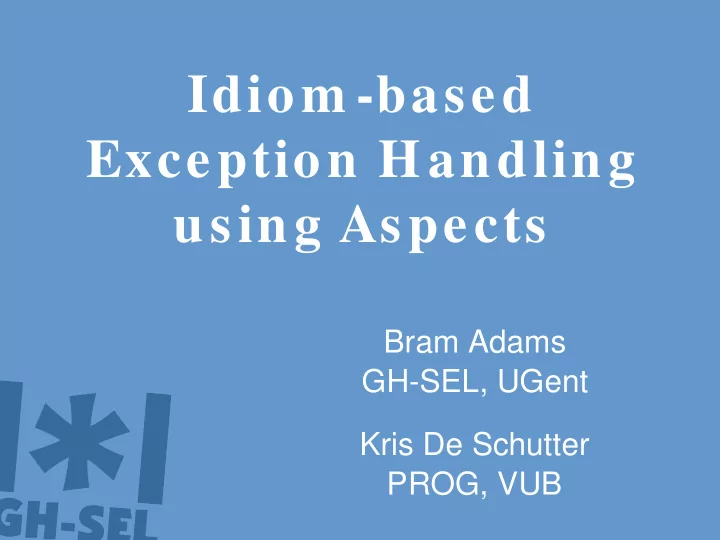

Idiom -based Exception Handling using Aspects Bram Adams GH-SEL, UGent Kris De Schutter PROG, VUB
Outline 1. Idiom-based Exception Handling 2. Analysis 3. Local Continuation Join Point: theory 4. Local Continuation Join Point: practice 5. Manual Recovery 6. Other Aspects 7. Aspicere2 8. Discussion 9. Conclusion 2
1. Idiom -based Exception Handling (a) int f(int a, int** b){ ... int r = OK; if(r == OK){ bool allocated = FALSE; r = g(a); r = mem_alloc(10, (int**) b); if(r != OK){ allocated = (r == OK); LOG(LINKED_ERROR,r); r = LINKED_ERROR; if((r == OK) && ((a < 0) || (a > 10))){ } r = PARAM_ERROR; } LOG(r,OK); /*root*/ if(r == OK) r = h(b); } if((r != OK) && allocated) ... mem_free(b); return r; main logic rest crosscutting concerns }
1. Idiom -based Exception Handling (b) /*@range("a",0,10)*/ aspects int f(int a, int** b){ mem_alloc(10, (int**) b); /*@log("LINKED_ERROR")*/ g(a); h(b); Design decisions: } • aspects are written once • no aspects written by developers main logic • annotations configure aspects bounds checking • return variables freely available logging to aspects
... 2. Analysis (a) if(r != OK){ LOG(LINKED_ERROR,r); int f(int a, int** b){ r = LINKED_ERROR; main logic int r = OK; if(r != OK) mem_free(b); r = mem_alloc(10, (int**) b); error var. return r; }else{ assignment if(r != OK){ r = h(b); /* no logging */ control flow if(r != OK){ /* no deallocation */ transfer /* no logging */ return r; logging if(r != OK) mem_free(b); }else{ return r; resource if((a < 0)||(a > 10)){ }else{ cleanup r = PARAM_ERROR; /* no deallocation */ bounds LOG(r,OK); return r; checking if(r != OK) mem_free(b); } return r; } }else{ } r = g(a); } ... }
2. Analysis (b) AOP-alternatives for control flow transfer: • setjmp/longjmp magic • continuation passing style • simple solution: procedure body - around-advice on each procedure call - no proceed() if error happened skipped int f(){ int g(int* i_ptr){ int i=0; ... do{ *i_ptr=1; g(&i); ... /*arithmetic and/or I/O on i*/ return SUDDEN_ERROR; }while(i); } infinite loop return OK; }
3. Local Continuation Join Point: theory (a) A continuation at any point in the execution of a program P: the future execution of P from that point on. target for advice target for advice Continuation of a join point p: join point representing the future execution after conclu- sion of p. int main(void){ void f(void){ around continuation f(); printf("A"); join point of call{ printf("C"); do_something(); A /*do NOTHING*/ return 0; printf("B"); } } }
3. Local Continuation Join Point: theory (b) Local continuation of a join point p: join point representing the future execution after conclu- sion of p, limited to the control flow of the procedure limited to the control flow of the procedure in which p is active. int main(void){ void f(void){ around LOCAL continuation join point f(); printf("A"); of call{ printf("C"); do_something(); AC /*do NOTHING*/ return 0; printf("B"); } } }
4. Local Continuation Join Point: practice (a) error property int around cflow_transfer(int* R R) on Jp: idiomatic_call(JpCall,R R) pointcut && !!manual(JpCall) control flow && local_continuation(Jp,JpCall){ transfer skip local if(*R R!=OK) skip local advice continuation continuation return *R R; advice (Aspicere2) else body return proceed(); } }
4. Local Continuation Join Point: practice (b) int_invocation(Jp,FName):- Prolog predicates invocation(Jp,FName), type(Jp,Type), idiomatic_call(Jp,R R):- type_name(Type,"int") int_invocation(Jp,FName), . \+wildcard(".*printf",FName), enclosingMethod(Jp,JpEncl), idiomatic_proc(Jp):- idiomatic_proc(JpEncl), execution(Jp,_), filename(Jp,"main.c") property(JpEncl,error_var,R R) . . limit scope of aspects exclude (standard) to idiomatic modules libraries
5. Manual Recovery int f(void){ int rethrow(int a){ int error=OK; return a; } /*@manual()*/ error=g(); if(error==EASY_TO_FIX){ /* full manual recovery */ }else if(error==EXTRA_CLEANUP){ /* do some initial recovery */ rethrow(error); } ... }
6. Other Aspects main logic error var. assignment error control flow property transfer logging resource cleanup bounds checking manual recovery 2 memory allocation properties
7. Aspicere2 .c .ac .pl .c .ac .pl compiler a.out Perl Low-Level .pl .c .c .pl .c .pl Virtual Machine llc Prolog SWI Prolog state Aspicere 2 .bc (LLVM) .bc interpreter llvm-gcc .bc link-time .bc weaving ...
[1] M. Bruntink, A. van Deursen, and T. Tourwé. An initial experiment in reverse engineering aspects. In Proc. 8 . Discussion (a) Code size estimation: • 20 kLOC module of which 1716 LOC of exception handling [1] of WCRE '04, pages 306-307. IEEE Computer Society, 2004. • aspects together with Prolog files account for 122 LOC 122 LOC • @log-annotation for each logged linked error • @manual-annotation + manual recovery code Migration (cf. [1] ): • find actual main concern and the relevant error values • remove error handling code • insert annotations Generic exception handling advice: • use of context variables for types, annotation attributes, etc. • robust pointcuts based on: - returning an integer; - local continuation join points; - annotations; - join point properties.
8 . Discussion (b) Costs of our approach: • build-time overhead (± factor 10) • run-time overhead (± 10%) : - advice is transformed into procedures; - cleanup aspect adds extra local variables. Benefits of our AOP-solution: • switch aspects to change exception handling strategy • code readability and evolvability • optimisation: - join point properties can be mapped onto local variables; - advice on local continuation join points can be inlined efficiently; - bounds checking aspect faster than idiom; - bytecode optimisation passes.
9. Conclusion Aspects: • hide return-code idiom administration ... • ... unless developer wants to do manual recovery Benefits: • centered around local continuation join points • fairly robust pointcuts and advice • improved code understandability and evolvability Costs: • limited run-time and build penalty
Recommend
More recommend